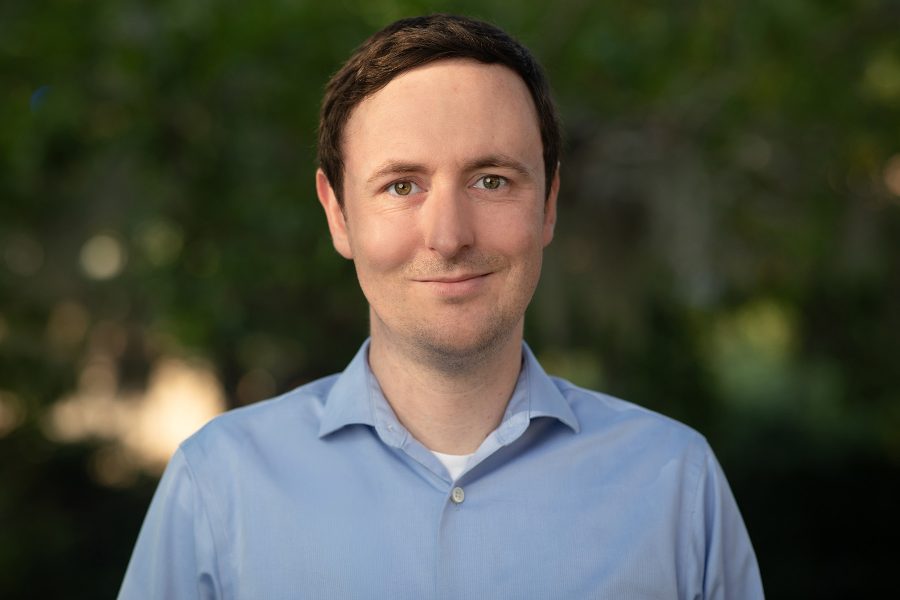Science
Florida State University Chemist Secures $2 Million NIH Grant

A researcher at Florida State University (FSU) has been awarded a significant grant to investigate cellular communication, which may lead to advancements in diagnosing and treating diseases such as diabetes and cancer. Assistant Professor of Chemistry and Biochemistry, Robert Lazenby, has received the Maximizing Investigators’ Research Award (MIRA) from the National Institute of General Medical Sciences, part of the National Institutes of Health (NIH). The grant, totaling $2,000,695, will support the Lazenby Laboratory over the next five years in developing advanced nanoscale imaging technologies that can measure the molecules found in living cells.
“This grant is huge news for our lab because it provides long-term, stable support,” said Lazenby. “It gives us the opportunity and freedom to pursue a range of ideas in multiple projects related to single-cell analysis — studying one cell at a time — as well as the resources to follow new discoveries as they emerge.”
MIRA is part of a larger NIH initiative aimed at enhancing research efficiency by supporting broad research activities, rather than individual projects with fixed goals. This approach is intended to offer greater stability and flexibility to investigators, ultimately fostering scientific productivity and facilitating significant discoveries.
Lazenby emphasized the impact of this grant on his laboratory’s research capabilities. “This opportunity strengthens the foundation of my lab’s research program and accelerates our ability to develop tools that could improve understanding of disease and inform future therapies,” he stated. “I am delighted that it affords my students the freedom to pursue new ideas without resource constraints.”
The funding will enable the Lazenby Laboratory to create innovative tools that accurately measure molecules within living cells. Each of the estimated 30 to 40 trillion cells in the human body contains various molecules, including serotonin, dopamine, and glucose, which are crucial for cellular functions. Lazenby’s research focuses on how these small molecules behave during cell communication, a process that is essential for functions such as growth, tissue repair, and immune responses. Disruptions in this communication are linked to numerous diseases, including Alzheimer’s, Parkinson’s, and cancer.
By exploring cellular communication at a molecular level, the Lazenby Laboratory’s work is poised to contribute significantly to new diagnostics and treatment strategies that could enhance healthcare outcomes.
“Long term, our development of advanced nanoscale imaging tools and new analytical methods could lead to a means of testing the efficacy of medical treatments without relying on animal or human studies,” Lazenby explained. “Our approach could also improve how we study diseases that are difficult to investigate with current imaging techniques, potentially leading to better diagnostic strategies across many health conditions from cancer to diabetes.”
The overarching focus of the Lazenby Laboratory is on electroanalytical chemistry. This field involves developing tools that study how cells communicate with one another through the release and detection of chemical signals. The tools funded by the MIRA grant will be capable of detecting multiple molecules simultaneously, including neurotransmitters, which are critical for communication between nerve cells. This advancement may deepen understanding of brain disorders and neuropsychiatric conditions, such as epilepsy and depression.
“Dr. Lazenby is an electroanalytical expert dedicated to the development of novel imaging modalities and sensing methodologies, enabling the study of complex biological systems that are beyond the reach of current techniques,” noted Wei Yang, Chair of the Department of Chemistry and Biochemistry at FSU. “The research program he builds will not only further enhance the department’s strength in analytical chemistry, but it will also contribute to the university’s renewed emphasis on molecular bio-design and drug discovery.”
For more information about Lazenby’s research and ongoing projects in the Department of Chemistry and Biochemistry, visit chem.fsu.edu.
-

 Technology5 months ago
Technology5 months agoDiscover the Top 10 Calorie Counting Apps of 2025
-

 Health3 months ago
Health3 months agoBella Hadid Shares Health Update After Treatment for Lyme Disease
-

 Health3 months ago
Health3 months agoErin Bates Shares Recovery Update Following Sepsis Complications
-

 Technology6 days ago
Technology6 days agoOpenAI to Implement Age Verification for ChatGPT by December 2025
-

 Technology4 months ago
Technology4 months agoDiscover How to Reverse Image Search Using ChatGPT Effortlessly
-

 Technology3 months ago
Technology3 months agoElectric Moto Influencer Surronster Arrested in Tijuana
-

 Technology1 month ago
Technology1 month agoDiscover 2025’s Top GPUs for Exceptional 4K Gaming Performance
-

 Technology5 months ago
Technology5 months agoMeta Initiates $60B AI Data Center Expansion, Starting in Ohio
-

 Technology5 months ago
Technology5 months agoRecovering a Suspended TikTok Account: A Step-by-Step Guide
-

 Health5 months ago
Health5 months agoTested: Rab Firewall Mountain Jacket Survives Harsh Conditions
-

 Health3 months ago
Health3 months agoAnalysts Project Stronger Growth for Apple’s iPhone 17 Lineup
-

 Lifestyle5 months ago
Lifestyle5 months agoBelton Family Reunites After Daughter Survives Hill Country Floods





















